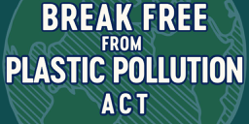House Democrats Unveil Broad Infrastructure Investment Package
![]() House Democrats have officially unveiled their broad infrastructure investment package, entitled the Moving Forward Act (H.R. 2), which builds off of the Moving Forward Framework House Democrats released earlier this year. H.R. 2 is an expansive package that would invest more than $1.5 trillion to support investment across the nation’s diverse infrastructure sectors, including clean water infrastructure. The Speaker of the House, Nancy Pelosi (D-CA), explained that the purpose of the package is to support the nation’s recovery following the coronavirus pandemic, as well as address inequities and injustices facing certain communities in this country. The House plans to pass the legislation before July 4.
House Democrats have officially unveiled their broad infrastructure investment package, entitled the Moving Forward Act (H.R. 2), which builds off of the Moving Forward Framework House Democrats released earlier this year. H.R. 2 is an expansive package that would invest more than $1.5 trillion to support investment across the nation’s diverse infrastructure sectors, including clean water infrastructure. The Speaker of the House, Nancy Pelosi (D-CA), explained that the purpose of the package is to support the nation’s recovery following the coronavirus pandemic, as well as address inequities and injustices facing certain communities in this country. The House plans to pass the legislation before July 4.
According to a fact sheet summarizing H.R. 2’s provisions, the bill would provide the following investments in the nation’s wastewater and drinking water infrastructure:
- Protects access to safe drinking water by investing over $25 billion in the Drinking Water State Revolving Fund and other programs to ensure all communities have clean drinking water and to help remove dangerous contaminants like PFAS from local water systems.
- Invests $40 billion in new wastewater infrastructure to encourage efficiency and affordability, and helps communities address stormwater needs, preventing pollution in local rivers.
- Invests in clean water and wastewater infrastructure to meet the federal government’s trust obligations to Indian Country and making responsible investments to repair severely damaged federal canals, leveraging taxpayer dollars to maximize public benefits.
- Unlocks more tax-exempt bond financing for water infrastructure projects by exempting bonds funding these projects from State allocation caps for Private Activity Bonds.
Senator Udall Reintroduces Plastics Pollution Bill with Wet Wipes Language
 Senator Tom Udall (D-NM) recently reintroduced an updated Break Free From Plastic Pollution Act (S. 3944) in the Senate. As explained by Udall when the bill was originally introduced in February, the Break Free From Plastics Act of 2020 aims to address the plastic pollution crisis by offering holistic solutions to tackle the public health, environmental, and economic issues associated with plastic pollution. The legislation includes provisions CASA helped to secure over the last year to address the issue of the flushing of single-use wet wipes down the toilet. Provisions include establishing “Do Not Flush” labeling requirements for synthetic wet wipes and requiring that non-synthetic wet wipes meet dispersibility performance standards outlined by the International Water Services Flushability Group. These provisions remain in the updated bill.
Senator Tom Udall (D-NM) recently reintroduced an updated Break Free From Plastic Pollution Act (S. 3944) in the Senate. As explained by Udall when the bill was originally introduced in February, the Break Free From Plastics Act of 2020 aims to address the plastic pollution crisis by offering holistic solutions to tackle the public health, environmental, and economic issues associated with plastic pollution. The legislation includes provisions CASA helped to secure over the last year to address the issue of the flushing of single-use wet wipes down the toilet. Provisions include establishing “Do Not Flush” labeling requirements for synthetic wet wipes and requiring that non-synthetic wet wipes meet dispersibility performance standards outlined by the International Water Services Flushability Group. These provisions remain in the updated bill.
The Senate Committee on Environment and Public Works then held a hearing, examining the issue of plastic pollution and recycling infrastructure in the United States. The hearing’s discussion revolved around three topics, the need to establish a market value for recycled plastic, realize that the solution to the plastic pollution and recycling crisis will need to be a multi-pronged approach, and that producers and manufacturers of plastic products have a responsibility in reducing plastic pollution and helping fix the broken recycling system.
Senator Udall testified before the committee and stressed the pervasiveness of the plastic pollution problem and the fact that the current recycling system is broken in the U.S. He contended that the manufacturers and producers of the plastic products must bear the costs of recycling of their products, not consumers and local governments. Udall also stated the need for a market for recycled plastic materials to support the reduction of the use of virgin plastics.
The next step for the bill will be for the committee to mark up the legislation.
Several Permit Streamlining Bills Introduced in the House and Senate

A series of bills have been introduced in the House and Senate aiming to update federal infrastructure permitting processes in an effort to support expediting project development and construction. The bills focus on consolidating the federal environmental review process, establish regulatory review commissions, address permitting determination delays, and establish timetables for opponents to bring litigation against project permits. The bills come as the House and Senate are considering broad transportation and water infrastructure bills.
The bills include:
- 3926, A bill to amend the FAST Act to improve the Federal permitting process, and for other purposes.
- 3927, A bill to establish a 90-day limit to file a petition for judicial review of a permit, license, or approval for a highway or public transportation project, and other purposes.
- 3922, A bill to establish Federal Regulatory Review Commissions, and other purposes.
- R. 7130, To amend title 23, United States Code, to streamline the environmental review process for major projects, and other purposes.
- H.R. 6691, Coronavirus Regulatory Repeal Act of 2020




 @CASA_CleanWater
@CASA_CleanWater